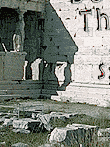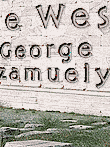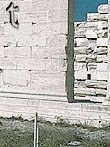 |
 |
 |
 |
 |
 |
 |
 |
 |
 |
September 8, 2000Armchair Warrior"Some ideas are so absurd that only an intellectual could believe them," George Orwell is supposed to have written somewhere. The doctrine of "humanitarian intervention" is one such idea. Most people assume that States are creatures driven by ruthless self-interest. But not Timothy Garton Ash – Fellow of St. Antony’s College Oxford, regular contributor to the New York Review of Books, and winner of innumerable prestigious prizes and awards. He will have us believe that the governments of the most powerful countries in the world are run by men and women motivated by the highest ideals, a thirst for justice, and the longing to alleviate human suffering. |
|
|
At times Garton Ash’s essay borders on the hilarious. He makes one admission after another, but appears to be too obtuse to realize that they undermine his entire case. Writing about the "ceasefire" agreement negotiated in October 1998 between Milosevic and US envoy Richard Holbrooke, Garton Ash states: "The cease-fire agreement…was to be ‘verified’ by an unarmed Kosovo Verifying Mission while the US envoy, Christopher Hill, tried to negotiate a political settlement. The Holbrooke-Milosevic agreement had one glaring flaw: even if the Serbs kept their word (a mighty ‘if’), the KLA was never party to it. So their units repeatedly violated the cease-fire, while using the breathing space to regroup and rearm." In other words, the October 1998 deal was a fraud from start to finish, perpetrated by the United States. The KLA had no intention of observing a "ceasefire" and was in cahoots with the Kosovo Verifying Mission, which we now know to have been largely a CIA operation. Therefore, Garton Ash pretty much concedes what any reasonably informed observer knew all along: The "humanitarian crisis" in Kosovo that NATO invoked to justify the bombing had been deliberated provoked by the United States and the KLA. "Any judgment on the wisdom or folly of Western policy depends on the answer to two questions," Garton Ash writes, "Why did Milosevic not back down at the beginning, when faced with the threat of bombing by the most powerful military alliance in the history of the world? Why did he cave in at the end? On July 12 this year I sent Milosevic an e-mail asking him these two questions, but I am not expecting an early reply." The last line is classic Garton Ash smugness. Having framed the issues in such a ludicrous, not to say dishonest way, he takes Milosevic’s refusal to answer his "questions" as yet further evidence of the Yugoslav leader’s reprobate character. How does Milosevic’s backing down or not backing down when faced by the "the threat of bombing by the most powerful military alliance in the history of the world" reflect on the "wisdom or folly of Western policy"? Is Garton Ash suggesting that bullying a small country is wise if said small country takes the prudent course and surrenders? And, foolish, if said small country takes the honorable course and fights back? Here is a policy of astonishing cynicism – an interesting addition to the evidently still evolving doctrine of "humanitarian intervention." Interesting also is Garton Ash’s complacent judgment that Milosevic caved in at the end. Any reasonable assessment of the record demonstrates clearly that Milosevic extracted one crucial concession after another from NATO. The final terms on which he settled were a far cry from what he rejected at Rambouillet. Appendix B has gone; talk of a referendum on the future of Kosovo has gone; NATO troops are there under UN auspices. The Serbs had been ready to settle on just these terms at Rambouillet. Garton Ash, of course, ignores this entirely. Otherwise, he would have to call into question the "wisdom of Western policy." Undeterred, Garton Ash continues merrily along with his often inane and complacent judgments. He concludes, not surprisingly, that "humanitarian intervention" must become a lot less "humanitarian." In the name of doing good, we must be ready to do bad. Such third-rate Machiavellianism is what passes for strategy these days. "To compel dictators like Milosevic to treat their own citizens with minimal decency," he writes, "we have to generate a credible military threat. This involves seriously preparing to do horrible things – both endangering innocent civilians in the guilty state and risking our own soldiers’ lives in ground action. The more awful the threat, the less likely it is that we will have to do what we say we will do. Faced with an overwhelming menace, Milosevic would probably have climbed down before the war began. By credibly threatening war, you may avoid it. But the rainbow coalition of bourgeois democracies that we call the West, let alone the wider so-called ‘international community,’ seems structurally incapable of generating such a threat. The Western liberal societies that care most about stopping gross violations of human rights in other countries also have the most difficulty in willing the means best suited to achieve that end. This is our post-Kosovo dilemma." Note the usual cosseted intellectual’s demand that we do "horrible things," not to mention the well beyond call-up age man’s eagerness to risk "soldiers’ lives." Note the wholly unwarranted assumption that Milosevic did not believe NATO would go ahead and bomb. And as for the "Western liberal societies that care most about stopping gross violations of human rights in other countries also have the most difficulty in willing the means best suited to achieve that end," Garton Ash has to be kidding. The United States and the countries of the West in general do not have the slightest hesitation about inflicting massive suffering on others. To cite just one example, the appalling conditions in which Iraqis today live after 10 years of sanctions is a matter of complete indifference Western policymakers and public opinion alike. The idea that we are suffering from excessive humanitarianism is, of course, very flattering to us. The real post-Kosovo dilemma, however, is whether an insufferably self-righteous West will soon find itself confronted, not by fanciful Hitlers, but by real opponents. Please Support Antiwar.comSend contributions to Antiwar.com or
Contribute Via our Secure Server |

